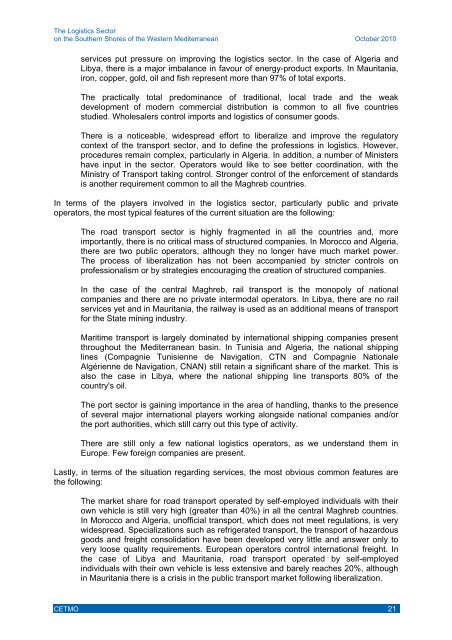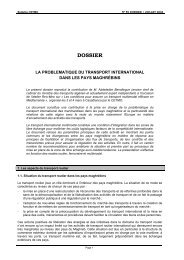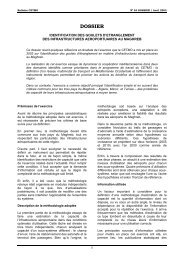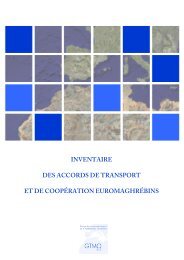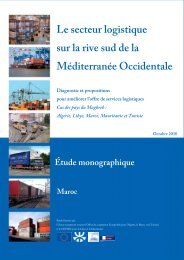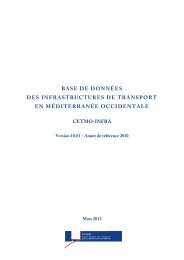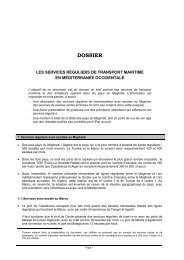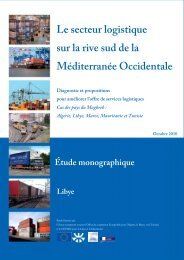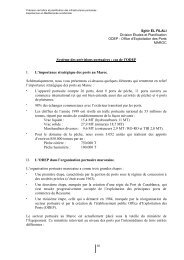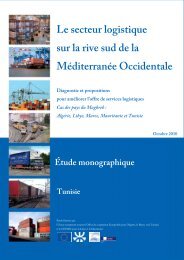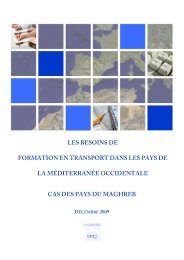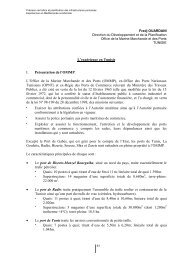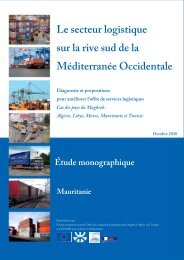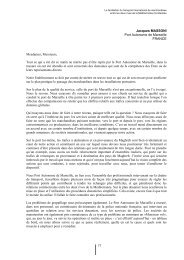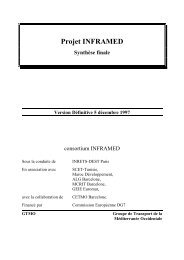The Logistics Sector on the Southern Shores of the Western ... - cetmo
The Logistics Sector on the Southern Shores of the Western ... - cetmo
The Logistics Sector on the Southern Shores of the Western ... - cetmo
- No tags were found...
Create successful ePaper yourself
Turn your PDF publications into a flip-book with our unique Google optimized e-Paper software.
<str<strong>on</strong>g>The</str<strong>on</strong>g> <str<strong>on</strong>g>Logistics</str<strong>on</strong>g> <str<strong>on</strong>g>Sector</str<strong>on</strong>g><strong>on</strong> <strong>the</strong> Sou<strong>the</strong>rn <strong>Shores</strong> <strong>of</strong> <strong>the</strong> <strong>Western</strong> Mediterranean October 2010services put pressure <strong>on</strong> improving <strong>the</strong> logistics sector. In <strong>the</strong> case <strong>of</strong> Algeria andLibya, <strong>the</strong>re is a major imbalance in favour <strong>of</strong> energy-product exports. In Mauritania,ir<strong>on</strong>, copper, gold, oil and fish represent more than 97% <strong>of</strong> total exports.<str<strong>on</strong>g>The</str<strong>on</strong>g> practically total predominance <strong>of</strong> traditi<strong>on</strong>al, local trade and <strong>the</strong> weakdevelopment <strong>of</strong> modern commercial distributi<strong>on</strong> is comm<strong>on</strong> to all five countriesstudied. Wholesalers c<strong>on</strong>trol imports and logistics <strong>of</strong> c<strong>on</strong>sumer goods.<str<strong>on</strong>g>The</str<strong>on</strong>g>re is a noticeable, widespread effort to liberalize and improve <strong>the</strong> regulatoryc<strong>on</strong>text <strong>of</strong> <strong>the</strong> transport sector, and to define <strong>the</strong> pr<strong>of</strong>essi<strong>on</strong>s in logistics. However,procedures remain complex, particularly in Algeria. In additi<strong>on</strong>, a number <strong>of</strong> Ministershave input in <strong>the</strong> sector. Operators would like to see better coordinati<strong>on</strong>, with <strong>the</strong>Ministry <strong>of</strong> Transport taking c<strong>on</strong>trol. Str<strong>on</strong>ger c<strong>on</strong>trol <strong>of</strong> <strong>the</strong> enforcement <strong>of</strong> standardsis ano<strong>the</strong>r requirement comm<strong>on</strong> to all <strong>the</strong> Maghreb countries.In terms <strong>of</strong> <strong>the</strong> players involved in <strong>the</strong> logistics sector, particularly public and privateoperators, <strong>the</strong> most typical features <strong>of</strong> <strong>the</strong> current situati<strong>on</strong> are <strong>the</strong> following:<str<strong>on</strong>g>The</str<strong>on</strong>g> road transport sector is highly fragmented in all <strong>the</strong> countries and, moreimportantly, <strong>the</strong>re is no critical mass <strong>of</strong> structured companies. In Morocco and Algeria,<strong>the</strong>re are two public operators, although <strong>the</strong>y no l<strong>on</strong>ger have much market power.<str<strong>on</strong>g>The</str<strong>on</strong>g> process <strong>of</strong> liberalizati<strong>on</strong> has not been accompanied by stricter c<strong>on</strong>trols <strong>on</strong>pr<strong>of</strong>essi<strong>on</strong>alism or by strategies encouraging <strong>the</strong> creati<strong>on</strong> <strong>of</strong> structured companies.In <strong>the</strong> case <strong>of</strong> <strong>the</strong> central Maghreb, rail transport is <strong>the</strong> m<strong>on</strong>opoly <strong>of</strong> nati<strong>on</strong>alcompanies and <strong>the</strong>re are no private intermodal operators. In Libya, <strong>the</strong>re are no railservices yet and in Mauritania, <strong>the</strong> railway is used as an additi<strong>on</strong>al means <strong>of</strong> transportfor <strong>the</strong> State mining industry.Maritime transport is largely dominated by internati<strong>on</strong>al shipping companies presentthroughout <strong>the</strong> Mediterranean basin. In Tunisia and Algeria, <strong>the</strong> nati<strong>on</strong>al shippinglines (Compagnie Tunisienne de Navigati<strong>on</strong>, CTN and Compagnie Nati<strong>on</strong>aleAlgérienne de Navigati<strong>on</strong>, CNAN) still retain a significant share <strong>of</strong> <strong>the</strong> market. This isalso <strong>the</strong> case in Libya, where <strong>the</strong> nati<strong>on</strong>al shipping line transports 80% <strong>of</strong> <strong>the</strong>country's oil.<str<strong>on</strong>g>The</str<strong>on</strong>g> port sector is gaining importance in <strong>the</strong> area <strong>of</strong> handling, thanks to <strong>the</strong> presence<strong>of</strong> several major internati<strong>on</strong>al players working al<strong>on</strong>gside nati<strong>on</strong>al companies and/or<strong>the</strong> port authorities, which still carry out this type <strong>of</strong> activity.<str<strong>on</strong>g>The</str<strong>on</strong>g>re are still <strong>on</strong>ly a few nati<strong>on</strong>al logistics operators, as we understand <strong>the</strong>m inEurope. Few foreign companies are present.Lastly, in terms <strong>of</strong> <strong>the</strong> situati<strong>on</strong> regarding services, <strong>the</strong> most obvious comm<strong>on</strong> features are<strong>the</strong> following:<str<strong>on</strong>g>The</str<strong>on</strong>g> market share for road transport operated by self-employed individuals with <strong>the</strong>irown vehicle is still very high (greater than 40%) in all <strong>the</strong> central Maghreb countries.In Morocco and Algeria, un<strong>of</strong>ficial transport, which does not meet regulati<strong>on</strong>s, is verywidespread. Specializati<strong>on</strong>s such as refrigerated transport, <strong>the</strong> transport <strong>of</strong> hazardousgoods and freight c<strong>on</strong>solidati<strong>on</strong> have been developed very little and answer <strong>on</strong>ly tovery loose quality requirements. European operators c<strong>on</strong>trol internati<strong>on</strong>al freight. In<strong>the</strong> case <strong>of</strong> Libya and Mauritania, road transport operated by self-employedindividuals with <strong>the</strong>ir own vehicle is less extensive and barely reaches 20%, althoughin Mauritania <strong>the</strong>re is a crisis in <strong>the</strong> public transport market following liberalizati<strong>on</strong>.CETMO 21


